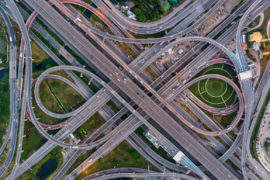If Africa can address its power crisis through the widespread use of renewable energy solutions and smart power technologies, it will ensure that all who call the continent home can plug into clean, sustainable and cost-effective electricity in the years to come—powering up the region’s post-pandemic recovery in the process. Kieran Whyte, Partner and Head of the Energy, Mining and Infrastructure Practice Group in Johannesburg, and Marc Fevre, Partner in London, look at recent developments to Africa’s smart power sector.
Across Africa, access to power has been hampered by the lack of access to competitive funding, the dire state of the continent’s utility infrastructure, and the need for energy policy and legislation to be adopted to boost investment in the sector. Post COVID-19, new solutions are urgently needed to address Africa’s power crisis and switch on a continent-wide strategy for its recovery and renewal. Such solutions must take into account the energy transition and the utilization of renewable energy, the focus on smart power technologies and cost-effective solutions, and the global drive towards a decentralized, decarbonized, and secure energy supply that addresses climate change and stimulates economic growth.
The South African National Energy Association (SANEA) recently published the “South African Energy Risk Report 2020” (Report), in which it outlined how clean energy could aid in South Africa’s economic recovery post-COVID-19. However, the report noted that for the energy transition to occur, infrastructure gaps should be addressed, and policy and legal frameworks need to change to allow for the necessary investment in the sector.
To address urgent energy needs across Africa, the African Union (AU) Commission and the International Renewable Energy Agency (IRENA) agreed in May 2020 to work together to alleviate the impact of COVID-19 and ensure that Africa can meet its development goals. According to the AU, the focus of this agreement was on supporting the development and adoption of innovative renewable energy technologies, improving access to energy, building more resilient energy systems, mobilizing international support including the private sector, developing larger and more robust power markets, and encouraging cross-border trade of renewable power.
Africa has a role to play in innovating smart power solutions for a post-COVID-19 world and ensuring a sustainable and diversified energy mix. Within developing economies, there are growing opportunities to implement new technologies and localized energy generation systems that lead to innovation that will change how the world generates, stores, and distributes power. The combination of the rise of cost-effective renewable energy, the decentralization of energy production, and improvements in energy storage, smart metering, and other digital technologies can revolutionize the way power is generated and consumed.
Across Africa, new systems and networks can be designed around future environmental stressors and energy demands without considering the limitations of old infrastructure. With advanced use of mobile technology in Africa and the lack of existing electricity transmission networks, these developments allow communities in Africa to gain access to power by leapfrogging the traditional model of centralized generation and transmission of power.
Long before COVID-19 shone a bright light on the continent’s energy crisis, investors in Africa’s energy sector were looking at opportunities to back innovative energy solutions that could address rapidly changing energy demands and environments. According to a Baker McKenzie report, the Smart Power Revolution – Opportunities and Challenges (report), more than 40% of the global energy companies surveyed said smart power was a core part of their business, and 37% had established at least one business line related to smart power.
In Africa, the most noticeable trend has been the transition towards decentralized power solutions and solar home systems from being a niche sector dominated by NGOs to being considered a mainstream investment focus by the big players. To name a few, Engie, EDF, Marubeni, and Mitsui, which have traditionally focused on grid-scale generation, have all been investing in and buying or developing businesses in this area in Africa.
Instead of a lack of scale being an obstacle to getting the market going, companies have been developing models to scale up the sector themselves and build businesses or portfolios. To date, these have been mainly financed on corporate balance sheets, but bankers are also taking notice and looking at how to put in place bankable business structures.
There is a need to look at how to mitigate the short-term impact of COVID-19 on this sector – being consumer-facing, it has been much more heavily impacted than a utility-scale generation. It is critical to ensure that the pandemic does not irrevocably damage a sector essential to Africa’s post-COVID-19 recovery and renewal. It is helpful that governments across Africa have acknowledged the need to adapt their legal and regulatory frameworks and introduced programs and incentives to boost this investment in innovative projects in the power sector.
Multilateral and development finance institutions have been important allies in the development and mobilization of funding in Africa’s renewable energy sector. They have provided funding for projects, but they have structured successful programs to address some of the political and credit risk issues that have hampered plans in many countries.
For example, Zambia was the first country in Sub-Saharan Africa to implement the Scaling Solar program, with support from the World Bank Group through the International Finance Corporation (IFC). The program facilitates the development of privately owned, utility-scale solar PV projects and enables governments and utilities to procure solar power cheaply and efficiently. Zambia’s solar PVs success led to the extension of the program to Senegal. The 2019 scaling solar PV tender in Senegal set a new price benchmark for the region and made solar energy Senegal’s cheapest energy source. The extension of the program to Ethiopia encountered obstacles around currency convertibility, but the IFC is extending the program to Côte d’Ivoire, Madagascar, and Togo. Similarly, the KfW-backed GET-FiT program has enabled several projects (in a particular run of the river hydropower projects) to be developed in Uganda and Zambia to date, with extension to Mozambique and other countries under consideration.
These DFI/multilateral programs, however, take time and resources to implement and are dependent on particular structures that cannot easily be implemented without the involvement of these institutions. There remains a need for more local-led development of the sector, supported by appropriate tools and resources. One example of this would be Kenya’s National Electrification Strategy, launched by the Government of Kenya and the World Bank. It uses a geospatial tool to identify the least-cost options for securing the delivery of electricity to houses and businesses in Kenya. It also outlines the vital role of private sector investment in providing off-grid solutions to remote areas.
If the continent can build on these initiatives and is successfully able to address its power crisis through the widespread use of renewable energy solutions and smart power technologies, it will ensure that all who call it home can plug in to clean, sustainable and cost-effective electricity in the years to come, powering up Africa’s post-pandemic recovery in the process.



